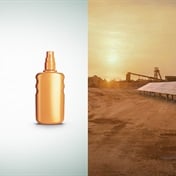- The Grand Ethiopian Renaissance Dam is, as of this weekend, full.
- The dam has direct implications on the flow of the Nile River, which is also shared by Sudan and Egypt.
- Former US president Donald Trump, during his term, suggested Egypt could bomb it because of disagreements about its construction.
The Grand Ethiopian Renaissance Dam, which sits on a tributary to the Nile River, underwent its last filling on Saturday - ignoring long-standing and strenuous objections from Sudan and Egypt.
On Sunday, Ethiopian Prime Minister Abiy Ahmed officially cut the ribbon to commission electricity generation from the dam, whose reservoir is "half the size of London" and set to be Africa's biggest hydroelectricity project.
The reservoir was initially anticipated to hold 74 billion cubic metres of water and produce up to 6 000 MW of electricity when construction began in 2011.
But after Ahmed came to power, the number of turbines was decreased from 16 to 13 to produce 5100 MW.
Only two turbines have been built so far.
It was recently reported the building of the dam would continue for another five to six years because the middle wall needed to be raised for the reservoir to have the initial intended capacity of 74 billion cubic metres.
In a statement issued in Amharic, Ahmed said: "By filling the Renaissance Dam with water and letting Ethiopia know that it is invincible and can achieve what it wants, we have started works that will heal the hearts of generations."
Regional pressure
The dam has direct implications for the Nile, which is critical to both Sudan and Egypt.
Its filling was against Egypt's wishes that there should be legal instruments to govern the use of the water.
Egypt put pressure in the international community, and the US vowed if the issue was not solved amicably, it would cut aid to Ethiopia.
READ | Tensions brew over Ethiopia's controversial mega-dam
Ethiopia wanted to fill up the reservoir over a period of six years, while Egypt had suggested up to 10 years to avoid dropping the water levels of the Nile.
While Sudan is preoccupied with an internal war between the junta factions of the rulership, the country's standpoint along with Egypt, which are both downstream states, is the dam will affect the water supply of its people who rely on the Nile for agriculture, tourism, and fisheries.
Ahmed said despite all that pressure from the two countries, "there was too much pulling for us to turn back. We had an internal [Sudan and Egypt] challenge with external pressure [US]".
Ethiopia's main argument for pushing ahead with the dam was that it would electrify the whole region.
However, this did not stop Egypt, which gets 90% of its fresh water from the Nile, from threatening to bomb the project in 2020.
Who owns the Nile?
The Nile is the longest river in Africa, stretching for about 6 650km to the Mediterranean Sea.
The river has two main tributaries, the White Nile and the Blue Nile.
Egypt and Sudan, according to a 1959 treaty, have almost all rights on Nile waters.
The treaty also gave Egypt the right to decide on upstream projects because they have a direct effect on its access to the water.
However, the Blue Nile is the source of the majority of the water, and it falls under the control of Ethiopia.
This gave Ethiopia the leverage to disregard the 1959 treaty and move on with the project.
It waited for the perfect storm to brew during the Arab Spring and went ahead with the project which Egyptian President Abdul Fattah al-Sisi said would never have been allowed had the country been politically stable.
The News24 Africa Desk is supported by the Hanns Seidel Foundation. The stories produced through the Africa Desk and the opinions and statements that may be contained herein do not reflect those of the Hanns Seidel Foundation




 Publications
Publications
 Partners
Partners


























